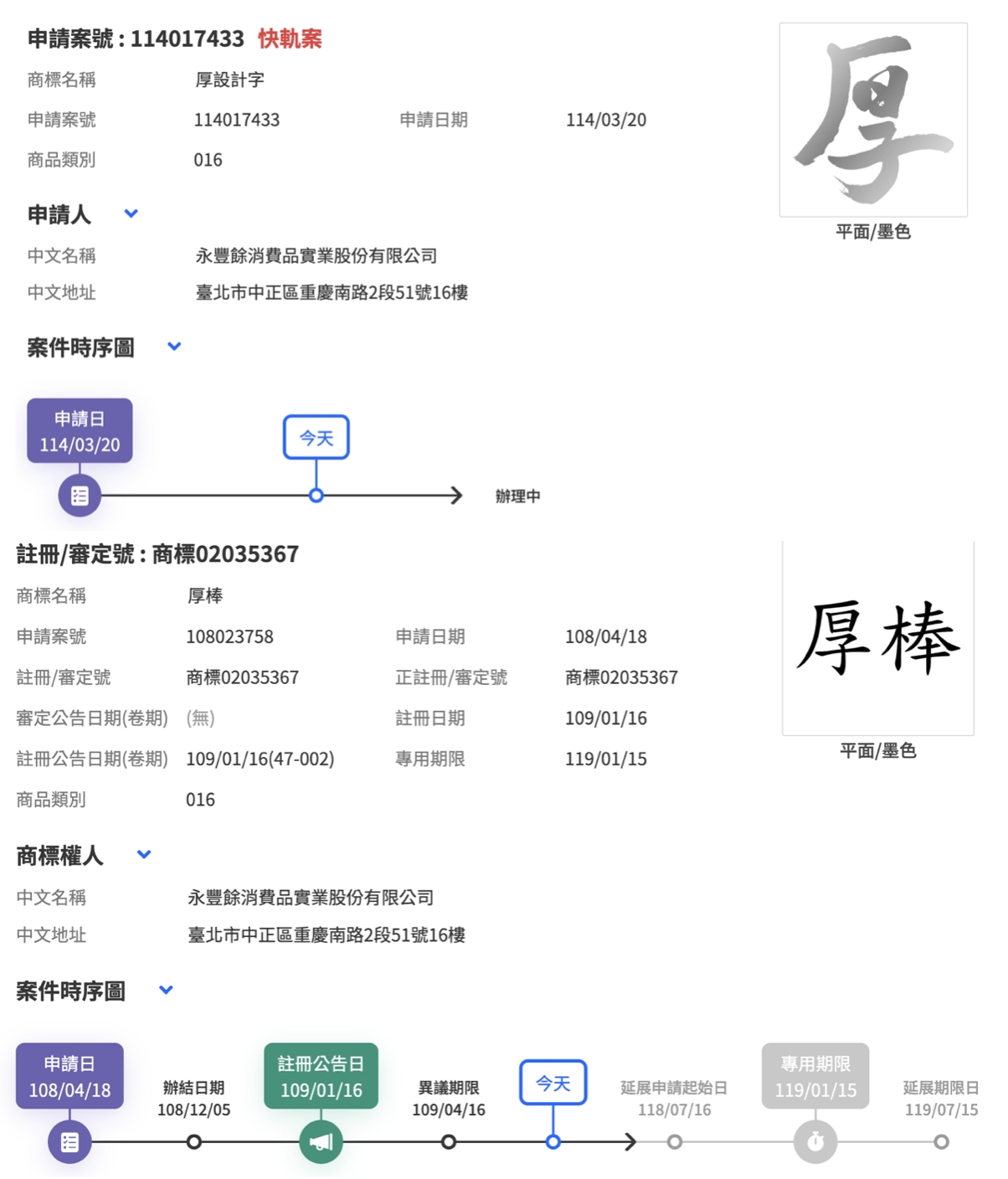July 24, 2025 Copyright ©️ 2025 by goldkeen International Patent & Trademark Joint Office
A recent controversy has emerged in Taiwan’s toilet paper market:Tangula Co., based in Beigang Township, Yunlin County, has claimed that it received a legal letter from leading domestic toilet paper manufacturer YFY (Yuen Foong Yu). The letter accused Tangula’s “Bunny Bear” toilet paper of trademark infringement for using the Chinese character “厚” (meaning “thick”) on its packaging. YFY also allegedly notified Tangula’s distribution partners directly, which Tangula claims has harmed its market competitiveness.
In response, Tangula argued that the character “厚” has not been validly registered as a trademark. Moreover, Tangula countered that YFY may have infringed on its patented “three-hole hanging” packaging design. The company further asserted that YFY’s actions constitute unfair competition, and has demanded a formal apology and public clarification. Tangula stated that if YFY fails to comply, it does not rule out taking legal action.
1. Does the Character "厚" Constitute a Validly Protected Trademark?
According to news reports, although YFY previously applied for trademark registration of the combined term “厚棒” (literally “thick stick”), the character “厚” (meaning “thick”) is a common descriptive adjective and lacks distinctiveness as a standalone trademark. Therefore, it cannot be registered independently as a trademark.
In other words, even though the combined mark “厚棒” is currently registered, this alone does not justify claims of infringement against other toilet paper products on the market that also use the character “厚”.
A search on the Taiwan Intellectual Property Office’s database reveals that YFY submitted a separate trademark application for the character “厚” in March of this year (2025). However, the application is still under substantive examination and has not yet been granted trademark rights.
As such, YFY’s allegation that Tangula’s use of “厚” constitutes infringement appears to lack a solid legal basis and may amount to an abuse of trademark claims.

2. Concerns Over Infringement of Tangula’s Packaging Patent Rights
Tangula stated that its “three-hole hanging” packaging design has already been granted a patent. However, YFY’s multi-functional hanging tissue packaging—currently on the market—raises concerns of potential patent infringement.
While YFY has claimed to possess a letter of patent authorization, the validity and scope of that claim remain to be verified, depending on how both parties present their evidence going forward.
Under Taiwan’s Patent Act, any design or technology that has been lawfully registered and granted patent rights is entitled to exclusive protection. In other words, Tangula, as the rightful patent holder, is legally entitled to demand that YFY cease using the patented “three-hole hanging” design and may also seek damages for infringement in order to defend its intellectual property rights.
3. Do YFY’s Actions Violate the Fair Trade Act?
YFY, without having obtained trademark approval for the character “厚”, issued legal letters to Tangula and its distribution partners, accusing them of infringement. This action allegedly disrupted Tangula’s sales and may constitute a violation of fair competition principles.
According to Article 25 of the Fair Trade Act, if a company has not yet secured formal trademark rights but still uses legal threats—such as attorney letters—to intimidate competitors and influence their distribution relationships, such conduct may constitute false or misleading representations, thereby hindering fair market competition.
4. Recommended Protection Strategies for Brand Owners
This case highlights the importance of legal protection strategies for brand owners:
1.Obtain Valid Trademark Registrations
When using distinctive signs or wording on products, brands should file trademark applications as early as possible to avoid future legal disputes arising from unenforceable trademark claims.
2.Plan Patent Protection for Packaging and Product Design
If the packaging or functional design of a product involves innovation, companies should promptly apply for design or utility patents to establish competitive advantages and be prepared to enforce their rights in the event of infringement.
3.Use Legal Warning Mechanisms Appropriately
Before obtaining official intellectual property rights, companies should refrain from issuing legal letters or warnings to competitors, as doing so may be considered an abuse of legal procedures and could expose them to legal liability.
4.Respond Proactively and Legally to False Allegations
When facing unfounded accusations, brand owners should act swiftly through professional legal channels to demand retractions or clarifications in order to protect their market reputation and prevent further commercial damage.
Conclusion
The dispute between Tangula and YFY over the use of the character “厚” on toilet paper packaging underscores the critical connection between brand protection and intellectual property rights.
YFY’s decision to issue legal warnings without holding a valid trademark for the character “厚” exposes the company to significant legal risk. On the other hand, Tangula’s possession of a packaging patent places it in a favorable legal position, but its failure to enforce its rights in a timely manner upon discovering potential infringement could lead to the erosion of its own protections.
Entrepreneurs and brand owners should take this case as a valuable lesson:they must strengthen their IP protection strategies, strictly comply with fair trade regulations, and refrain from engaging in improper competitive behavior. Only by doing so can brands maintain their reputation and build a secure, long-term position in the marketplace.
Do you have trademark concerns?Are you facing a trademark infringement issue?Don’t wait — message us now on LINE (ID: @goldkeen) for expert advice!🔍 For all things trademark, trust the specialists.
News source: https://reurl.cc/2QDlWE








